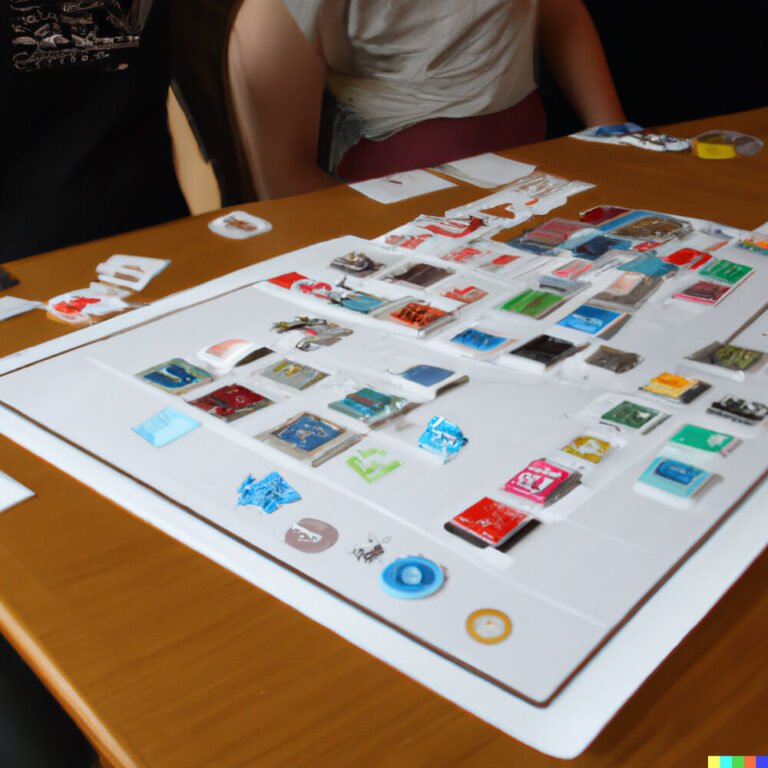Do you remember spending hours playing classic American board games with your family and friends? From Monopoly to Scrabble, these timeless games have been a staple in American households for generations. Their rich history and enduring popularity continue to make them a beloved pastime for people of all ages.
Classic American board games have a fascinating history, with roots dating back to the early 20th century. These traditional games were often designed to not only provide entertainment but also to teach valuable skills such as critical thinking, strategy, and decision-making. Over the years, they have remained a beloved form of recreation, with new generations continuing to embrace these timeless classics.
In this article, we will explore the evolution of classic American board games, from their humble beginnings to the modern era. We will take a closer look at some of the most iconic games that have stood the test of time, as well as strategies for winning and tips for creating homemade versions.
We’ll also discuss the social aspect of these games and how they provide an opportunity for bonding and creating cherished memories with loved ones. So gather around the table and prepare to embark on a journey through the world of classic American board games.
The Most Iconic Classic American Board Games
When it comes to classic American board games, there are a few iconic titles that stand out as classics. These games have stood the test of time and continue to be beloved by people of all ages. From the competitive nature of Monopoly to the word-building challenge of Scrabble, these games have become household names and are a staple in game nights across the country.
Some of the most iconic classic American board games include:
- Monopoly: This game was first released in 1935 and has since become one of the best-selling board games in the world. With its real estate theme and opportunity for strategic gameplay, it’s no wonder that Monopoly has remained popular for over 85 years.
- Scrabble: Known for its wordplay and vocabulary challenges, Scrabble has been a favorite among families and friends since it was first published in Players compete to create words and earn points based on letter values, making it a great game for both language enthusiasts and competitive gamers alike.
These classic American board games are not only entertaining, but they also provide a glimpse into American culture and history. Whether it’s the economic lessons learned from playing Monopoly or the linguistic skills honed while playing Scrabble, these games offer more than just fun – they also offer valuable learning experiences for players of all ages.
In addition to their educational value, classic American board games like Monopoly and Scrabble also serve as nostalgic reminders of simpler times. Many people have fond memories of playing these games with family and friends, making them more than just forms of entertainment – they are symbols of bonding and shared experiences. In today’s fast-paced digital world, it’s comforting to know that these timeless classics continue to bring people together for hours of fun and friendly competition.
Strategy and Tactics
When it comes to classic American board games, strategy and tactics play a crucial role in securing a victory. Whether you’re playing Monopoly, Scrabble, or any other beloved game, having a plan in place can significantly increase your chances of winning. Here are some tips for mastering the art of strategy and tactics in classic American board games:
Understand the Rules
Before diving into a game, make sure you have a solid understanding of the rules. Knowing how each piece moves or how points are scored is essential for formulating your strategy.
Analyze Your Opponents
Take the time to observe your opponents’ playing styles and moves. Are they aggressive or cautious? Do they tend to focus on offense or defense? Understanding their tendencies can help you anticipate their next move and adjust your strategy accordingly.
Adapt and React
Flexibility is key when it comes to classic American board games. As the game progresses, be prepared to adapt your strategy based on the unfolding circumstances. Whether it’s adjusting your property acquisition in Monopoly or changing your word formation approach in Scrabble, being able to react quickly and effectively will give you an edge over your opponents.
By incorporating these tips into your gameplay, you can enhance your chances of winning at classic American board games. Remember to stay patient, keep practicing, and most importantly – have fun. After all, that’s what these timeless games are all about: bringing people together for some friendly competition and entertainment.
The Social Aspect
One of the main reasons why classic American board games are so effective at bringing people together is their ability to facilitate social interaction. Unlike digital or online games, board games require players to sit around a table, engage in face-to-face communication, and interact with one another in a tangible and tactile way. This creates an environment that encourages conversation, laughter, and shared experiences, strengthening relationships and fostering a sense of camaraderie.
Moreover, playing classic American board games often involves teamwork and friendly competition, which can help build trust and rapport among participants. Team-based games like Pictionary or strategic games like Risk can promote collaboration and problem-solving skills while also allowing players to showcase their individual talents. By working towards a common goal or engaging in lighthearted rivalry, players can bond over shared achievements or learn from each other’s strategies.
| Classic American Board Game | Year Released |
|---|---|
| Monopoly | 1935 |
| Scrabble | 1948 |
As the popularity of classic American board games continues to endure, they remain a beloved form of entertainment for all ages. Whether it’s a family game night or a casual gathering with friends, these timeless classics provide an opportunity for fostering connections and enjoying the company of others in an increasingly digital world.
So next time you’re looking for an activity that encourages social interaction and bonding, consider pulling out one of these iconic board games for a memorable experience.
Classic American Board Games for Kids
The classic American board game has been a staple in households for decades, providing endless hours of entertainment and bonding opportunities for families and friends. While these games are often associated with nostalgia and friendly competition among adults, they also offer a wide range of educational and fun options for kids.
One iconic classic American board game that has stood the test of time is Scrabble. Not only does it challenge kids to expand their vocabulary and spelling skills, but it also sharpens their strategic thinking as they try to maximize their points on the game board. Additionally, games like Monopoly teach children valuable financial lessons as they manage money, negotiate deals, and make calculated risks to become the ultimate property tycoon.
Furthermore, classic American board games encourage social interaction and cooperation among kids. Games like Sorry. or Chutes and Ladders promote good sportsmanship and patience as children take turns and navigate through the ups and downs of gameplay. These experiences foster essential life skills such as patience, critical thinking, decision-making, and communication-all in a fun and engaging way.
Let’s not forget about the modern twist on classic American board games geared specifically toward kids. With updated designs, themes, interactive features, and even educational apps to supplement gameplay, these new releases continue to make learning exciting while preserving the timeless appeal of traditional board games.
| Classic American Board Game | Educational Benefits |
|---|---|
| Scrabble | Enhances vocabulary and strategic thinking |
| Monopoly | Teaches financial management skills and negotiation |
| Sorry. / Chutes and Ladders | Promotes good sportsmanship, patience, critical thinking, decision-making, |
The Evolution of Classic American Board Games
Traditional Classics
Classic American board games have been a staple in households for decades. Games like Monopoly, Scrabble, and Clue have stood the test of time and continue to be favorites among families and friends. These traditional classics have simple rules, timeless themes, and easy-to-understand gameplay that make them enduring favorites.
Modern Adaptations
In recent years, classic American board games have seen a resurgence in popularity with modern adaptations and reimagined versions. Game developers have taken beloved classics and given them a fresh twist, incorporating new themes, updated artwork, and innovative game mechanics to appeal to a new generation of players. This revitalization of classic games has introduced them to a whole new audience while still retaining the charm and nostalgia that made them popular in the first place.
Technology Integration
Another aspect of the evolution of classic American board games is the integration of technology. Many classic board games now have digital versions available on various platforms, allowing players to enjoy their favorite games on smartphones, tablets, or computers. These digital adaptations often come with added features such as online multiplayer modes, tutorials, and interactive elements that enhance the overall gaming experience while staying true to the essence of the original board game.
From traditional classics to modern adaptations and technology integration, classic American board games continue to evolve and adapt to new generations of players while maintaining their timeless appeal. As these games continue to stand the test of time, it’s clear that they will remain a beloved form of entertainment for years to come.
DIY and Homemade Versions of Classic American Board Games
For many people, playing classic American board games brings back nostalgic memories of family game nights and friendly competitions. However, some may find it expensive to purchase the commercial versions of these beloved games. Fortunately, there are alternative options for those who want to enjoy classic American board games without breaking the bank. One popular approach is to create DIY or homemade versions of these games using simple materials and a little creativity.
Recreating Monopoly
One of the most iconic classic American board games is Monopoly, which has been entertaining families for generations. To recreate this game at home, all you need is some cardboard, markers, and tokens.
You can draw the game board on a large piece of cardboard and create your own property cards and play money. This DIY version not only allows you to customize the game according to your preferences but also provides a cost-effective way to enjoy this timeless classic with friends and family.
Homemade Scrabble
Scrabble is another classic American board game that challenges players’ vocabulary skills. Creating a homemade version of Scrabble is relatively easy – all you need are letter tiles (which can be made from cardboard or wood) and a grid to place them on. You can even personalize the game by adding bonus spaces or incorporating different scoring rules. Making your own Scrabble set not only saves money but also allows for endless modifications and variations for an exciting gameplay experience.
Upcycling Old Game Boards
Another option for creating DIY versions of classic American board games is by upcycling old or unused game boards. For example, you can repurpose an old chess board into a checkers set by using contrasting bottle caps as playing pieces. Similarly, if you have an outdated Parcheesi board, you can redesign it into a unique version of Snakes and Ladders. Upcycling not only reduces waste but also gives new life to forgotten games while providing hours of entertainment.
Overall, making your own versions of classic American board games not only saves money but also promotes creativity and resourcefulness. Whether through traditional crafts or creative upcycling, DIY enthusiasts can enjoy their favorite games in customized and one-of-a-kind ways.
Remember that sharing homemade versions with others can become part of the fun; inviting friends over for an evening filled with lighthearted competition adds a layer of connection that modern technology often cannot replicate.
The Future of Classic American Board Games
In conclusion, classic American board games have maintained their popularity over the years and continue to be a beloved pastime for people of all ages. From the iconic Monopoly to the challenging Scrabble, these games have stood the test of time and are still enjoyed by many today. With the evolution of technology, there has been a shift towards digital versions of these traditional games, but there is still a strong market for the physical board game experience.
As we look towards the future of classic American board games, we can expect to see new releases and trends in the industry. Game companies are constantly innovating and creating new versions of old favorites, as well as developing entirely new games that capture the essence of what makes classic board games so enjoyable. Whether it’s incorporating modern themes or adding new gameplay mechanics, there is always something fresh on the horizon for fans of these timeless classics.
Furthermore, with an increasing focus on sustainability and eco-friendly practices, we may see a rise in environmentally conscious board game production. Many companies are making efforts to use recycled materials and reduce their carbon footprint in order to appeal to socially aware consumers. Despite these developments, one thing remains certain: classic American board games will continue to bring joy and entertainment to families and friends for generations to come.
Frequently Asked Questions
What Are the Top 5 Classic Board Games?
The top 5 classic board games are Chess, Monopoly, Scrabble, Clue, and Risk. These games have been popular for decades and are still widely played today.
What Was the First American Board Game?
The first American board game is generally considered to be “The Mansion of Happiness,” which was created in 1843. It was a morality-based game that aimed to teach players about virtues and vices.
What Is the Oldest Board Game in the United States?
The oldest board game in the United States is believed to be “Senet,” an ancient Egyptian game that dates back to around 3100 BC. This game has been found in archaeological excavations and is thought to have been brought over by early settlers.

I love playing all kinds of games – from classics like Monopoly to modern favourites like Ticket to Ride.
I created this blog as a way to share my love of board games with others, and provide information on the latest releases and news in the industry.





